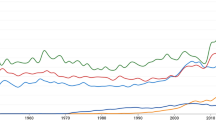Abstract
The measurement of Equitable and Sustainable Well-being (BES) in Italy is one of the most appreciated monitoring tools by the Scientific Community. The focus on the Economic Well-being domain seems essential around the last serious economic crisis. The use of an innovative composite index can help to measure the multidimensional phenomenon and monitor the situation at European level.
Access this chapter
Tax calculation will be finalised at checkout
Purchases are for personal use only
Similar content being viewed by others
Notes
- 1.
Obviously, we cannot forget the current crisis deriving from the Covid19 pandemic situation. However, the adopted indicators are not still available for 2020 in all the Countries. Moreover, it should be evaluated when the pandemic situation will be officially declared as finished.
- 2.
Note that socio-economic indicators are basically of two types: per capita indicators and percentage indicators. Per capita indicators tend to be open-ended, in particular at the upper end of the range (e.g., GDP per capita); percentage type indicators tend to have severe constraints operating at the upper end of the range, with consequent piling up of observation there (e.g., Adult literacy). Therefore, most of individual indicators have positively or negatively skewed distributions [2].
References
Canberra Group: Handbook on Household Income Statistics. United Nations, Geneva (2011)
Casacci, S., Pareto, A.: A nonlinear multivariate method for constructing profiles of country performance. Int. J. Multicriteria Decis. Mak. 8, 295–312 (2021)
Chiappero-Martinetti, E., von Jacobi, N.: Light and shade of multidimensional indexes. How methodological choices impact on empirical results. In: F. Maggino, G. Nuvolati (eds), Quality of life in Italy, Research and Reflections, pp. 69–103, Springer, Cham (2012)
Cutillo, A., Raitano, M., Siciliani, I.: Income-based and consumption-based measurement of absolute poverty: insights from Italy. Soc. Indic. Res. (2020). https://doi.org/10.1007/s11205-020-02386-9
Mazziotta, M., Pareto, A.: On a generalized non-compensatory composite index for measuring socio-economic phenomena. Soc. Indic. Res. 127, 983–1003 (2016)
Mazziotta, M., Pareto, A.: Everything you always wanted to know about normalization (but were afraid to ask). Ital. Rev. Econ., Demogr. Stat., LXXV 1, 41–52 (2021)
Sen, A.: Poor, relatively speaking. Oxford Econ. Ser. 35(2), 153–169 (1983)
Author information
Authors and Affiliations
Corresponding author
Editor information
Editors and Affiliations
Rights and permissions
Copyright information
© 2022 The Author(s), under exclusive license to Springer Nature Switzerland AG
About this paper
Cite this paper
Cutillo, A., Mazziotta, M., Pareto, A. (2022). A Composite Index of Economic Well-Being for the European Union Countries. In: Salvati, N., Perna, C., Marchetti, S., Chambers, R. (eds) Studies in Theoretical and Applied Statistics . SIS 2021. Springer Proceedings in Mathematics & Statistics, vol 406. Springer, Cham. https://doi.org/10.1007/978-3-031-16609-9_1
Download citation
DOI: https://doi.org/10.1007/978-3-031-16609-9_1
Published:
Publisher Name: Springer, Cham
Print ISBN: 978-3-031-16608-2
Online ISBN: 978-3-031-16609-9
eBook Packages: Mathematics and StatisticsMathematics and Statistics (R0)




